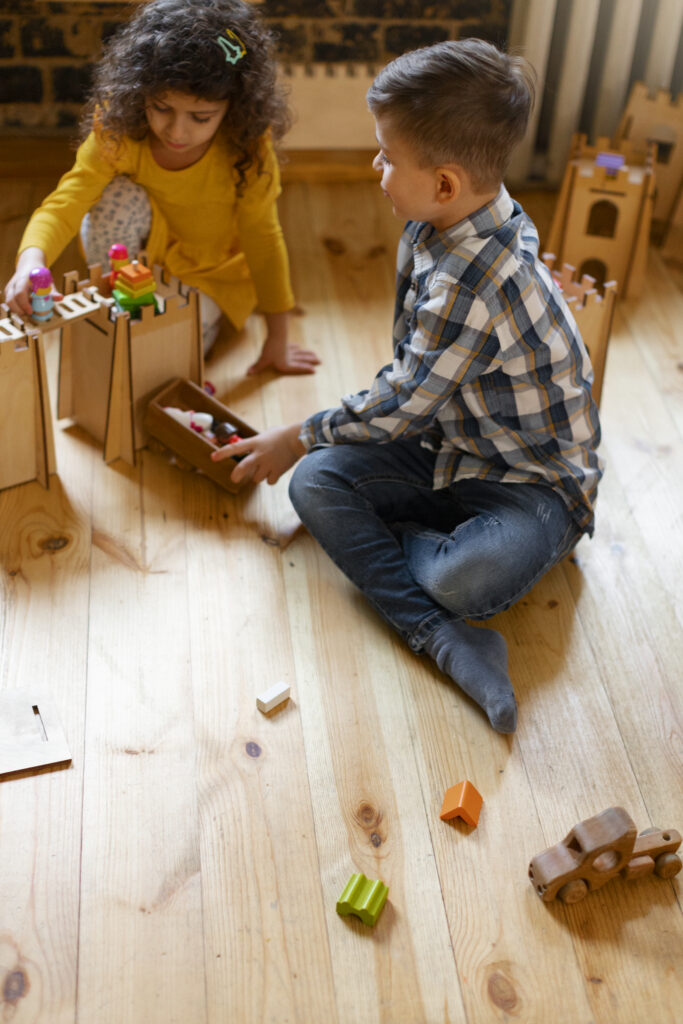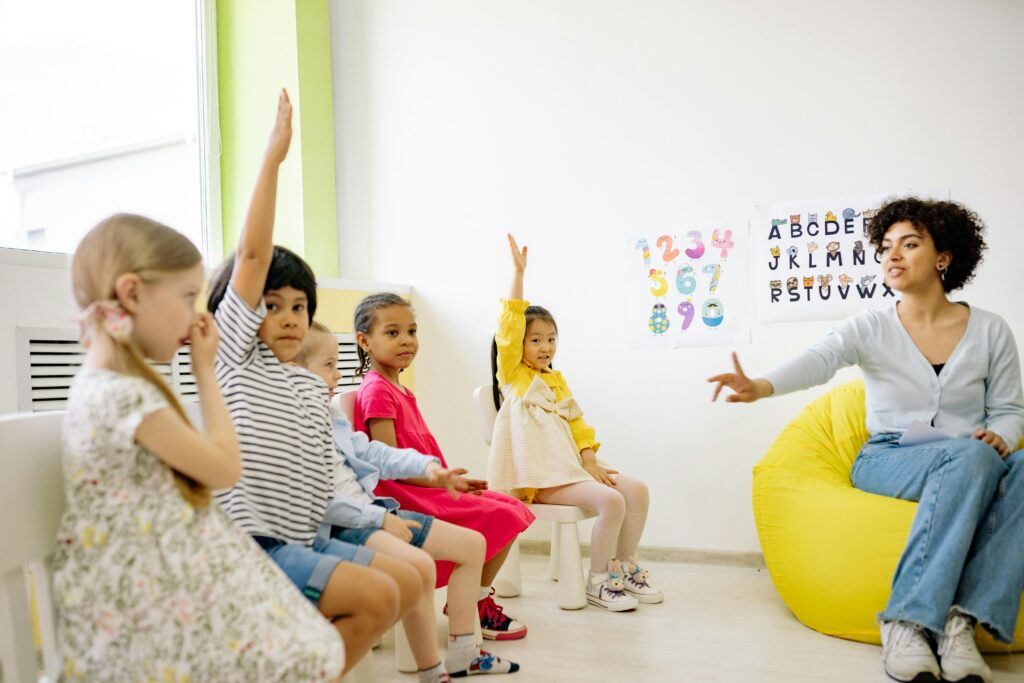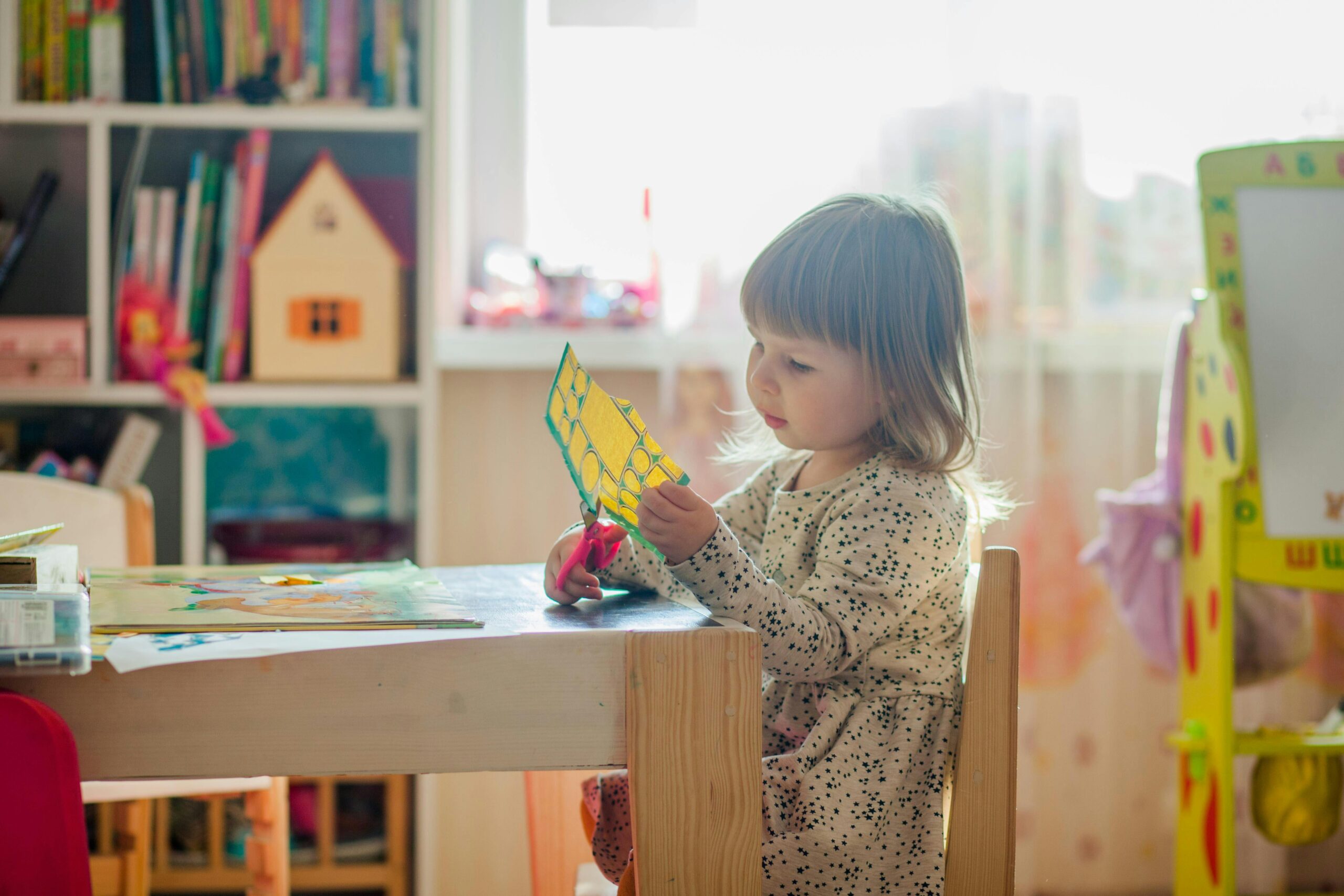Preparing Emotionally: Helping Your Child Adjust to the Idea of Starting Kindergarten
Starting kindergarten is a big milestone, not just for your child but for you as a parent too! The excitement of your little one embarking on their school journey can be mixed with a bit of nervousness. After all, the idea of being in a new environment with new people can feel overwhelming for a young child. But don’t worry—there are simple, effective ways you can help your child prepare emotionally and make this transition as smooth as possible. Let’s explore some easy tips to guide your little one through this exciting time!
Talk About School Positively and Often
One of the best ways to help your child adjust to the idea of starting kindergarten is by talking about it in a positive, exciting way. You can casually mention how much fun school will be, highlighting the new friends they’ll make, the cool things they’ll learn, and the playtime they’ll have. By framing school as a fun adventure, you’ll plant seeds of excitement rather than fear.
Instead of dropping the “school” bomb all at once, bring it up gradually in conversations. For instance, while driving past the school or when they’re playing with toys, you can say, “Hey, soon you’ll get to go to a big-kid school like this one! There are so many cool things to do there!” Regular, light-hearted mentions of school help make the concept feel familiar and less intimidating.
Create a Kindergarten Countdown
Children love the anticipation of exciting events, and starting school should be no different! You can create a simple countdown calendar for the first day of kindergarten, letting your child cross off the days. This gives them something visual to look forward to and helps them feel more prepared. You can even add fun activities or rewards on certain days leading up to school, like a trip to pick out a new backpack or a special family dinner.
To make the countdown more meaningful, you can associate each day with something they will do in kindergarten. For example, “In just five days, you’ll get to meet your new teacher!” or “Three more days until you explore the playground at your new school!” By building anticipation in a fun way, you’re helping your child get excited and emotionally ready for this new chapter.
Role-Play School Scenarios
Children learn a lot through play, so why not use this to your advantage? Role-playing school scenarios is a fantastic way to get your child comfortable with the idea of kindergarten. You can take turns being the “teacher” and “student,” acting out different parts of the school day. Play out simple scenarios, such as saying goodbye in the morning, sitting down for story time, or lining up with other children to go outside.
This kind of pretend play helps your child understand what to expect and reduces anxiety about the unknown. If your child has specific worries about school, like not knowing where to find the bathroom or what happens if they don’t know someone, you can incorporate those situations into the role-play. This builds their confidence and helps them feel emotionally prepared for any surprises.
Visit the School Together
If possible, take a tour of the school with your child before the first day. Walking through the school, seeing the classroom, and even meeting the teacher can make a huge difference in how comfortable your child feels. Familiarity can go a long way in easing first-day jitters.
Make the visit fun and exploratory. Let your child check out the playground, peek inside the classrooms, and look at the fun artwork on the walls. If the teacher is available, a quick introduction can help your child associate school with friendly faces. Many Ontario schools offer orientation events for new kindergarten students, so be sure to take advantage of those opportunities. The more your child sees the school as a friendly, familiar place, the less overwhelming the first day will feel.
Encourage Independence in Everyday Tasks
Helping your child feel emotionally ready for kindergarten also means encouraging a sense of independence. Many children feel more confident and capable when they can handle simple tasks on their own. You can start this process by encouraging them to take responsibility for little things like putting on their own shoes, zipping up their jacket, or carrying their backpack.
Not only does this give them practical skills for school, but it also helps them feel proud and ready for the “big kid” adventure ahead. Plus, when your child knows they can handle some tasks without always needing help, they’re likely to feel more emotionally secure in a school setting, where they won’t always have a parent by their side.
Practice Goodbyes and Hellos
The first few days of school can be emotionally challenging for children who struggle with separation anxiety. To help ease this transition, practice saying goodbye and hello during everyday situations. You can try this at daycare, playdates, or even when leaving the house for a quick errand. By making “goodbye” a regular, non-dramatic part of their routine, your child will feel less anxious when it’s time to say goodbye at school.
Developing a goodbye ritual can also help. Maybe it’s a special handshake, a hug, or a kiss on the cheek—whatever makes your child feel secure. Keep the goodbyes brief, reassuring, and upbeat. The key is to show your child that goodbyes aren’t forever and that they’ll soon be saying “hello” again after school. This routine will help them feel more emotionally prepared to tackle the school day.
Keep Calm and Stay Positive
Remember, your child will take cues from you when it comes to feeling ready for kindergarten. If you’re anxious or worried, they might pick up on those feelings too. Staying calm, positive, and encouraging will help your child feel the same. You’ve got this! Kindergarten is just the start of a fantastic journey for both you and your child. By preparing emotionally together, you’re setting the stage for a successful and exciting school experience.

Building Social Skills: Playdates and Activities to Foster Social Interaction
As parents, you want your little ones to thrive not just academically but also socially. Social skills are crucial for children’s emotional development, and kindergarten marks the beginning of their formal social journey. So, how do you ensure that your child is well-prepared to navigate friendships, share toys, and communicate effectively with their peers? The answer lies in fostering these skills early, and playdates and activities are perfect ways to do just that!
In this post, we’ll explore how you can help your child build social skills through fun, interactive playdates and group activities right here in Ontario. Let’s dive in and get your child excited about making new friends!
Why Playdates Are Essential for Social Development
Playdates are more than just an afternoon of fun. They provide your child with an opportunity to interact, cooperate, and communicate with other children outside the family setting. The social interactions that happen during playdates help your child learn how to share, take turns, resolve conflicts, and practice empathy.
Scheduling regular playdates before kindergarten starts gives your child a chance to get comfortable in social situations. You’ll notice that as your child engages with their peers, they become more confident in their ability to communicate and express themselves. Plus, they’ll learn the valuable lesson that it’s okay if things don’t always go their way — sharing and compromise are key parts of playing with others.
You don’t have to overthink playdates either. Whether it’s a trip to the park, a playdate at home, or even meeting up at a local library, the aim is to give your child the freedom to interact with others. Encourage them to explore new friendships and play with different children to expand their social circle.
Group Activities: Building Social Skills through Team Play
While playdates are a fantastic way for one-on-one interaction, group activities can offer even more social benefits. Team activities, whether in a structured class or informal setting, help children learn about group dynamics. From sports to group art classes, team activities teach your child to collaborate, follow instructions, and develop a sense of teamwork.
Ontario offers various group activity options, including sports leagues for young children, music or dance classes, and even nature walks organized by community groups. Engaging your child in these activities not only builds their physical and cognitive skills but also helps them understand how to function within a group. This is an essential skill for when they step into a kindergarten classroom full of other children.
A key benefit of group activities is that they expose your child to different personalities and ways of thinking. It’s through these diverse interactions that children learn how to get along with others, work toward a common goal, and understand that every child brings something unique to the table.
Choosing the Right Playdates and Activities
Not all playdates or activities are created equal, so it’s important to choose ones that align with your child’s interests and personality. If your child is shy or introverted, starting with smaller, low-pressure playdates might be the best approach. You could invite one or two friends over for a simple play session at home or take a quiet trip to a museum where your child can interact in a calm setting.
For more outgoing children, larger playdates or energetic group activities may be just what they need to thrive. Look into sports teams, community centers, or even local libraries that host group activities like storytelling or crafting sessions. It’s important to tailor social interactions to your child’s comfort level while gradually encouraging them to step out of their comfort zone.
Remember, the goal is to foster positive social experiences. If your child doesn’t enjoy a particular activity or playdate, don’t worry! Keep trying new things and find what sparks joy for them. The more they enjoy the experience, the more willing they’ll be to socialize.
Encouraging Social Skills During Playdates
Now that you’ve set up the playdate or enrolled your child in an activity, it’s time to subtly encourage those social skills! While it’s important to let your child take the lead in their interactions, you can gently guide them when needed.
For instance, if you notice your child struggling to share or take turns, you can calmly step in with suggestions like, “Why don’t we take turns using the blue crayon?” or “Let’s see if we can work together to build this tower.” Over time, these gentle nudges will help your child understand the importance of cooperation.
Additionally, encourage open communication. If a disagreement arises during a playdate, help your child express their feelings and listen to their friend’s perspective. Teaching your child how to communicate their emotions and listen to others lays the foundation for healthy social relationships.
Supporting Your Child After Social Interactions
Once the playdate or group activity is over, take a few moments to reflect on the experience with your child. Ask questions like, “Did you have fun playing with your friend today?” or “What was your favorite part of the activity?” This not only helps your child process the social interaction but also reinforces the idea that socializing is fun and rewarding.
If your child faced any challenges, like a disagreement or a shy moment, use this as a teaching opportunity. Offer encouragement and praise for their efforts, even if everything didn’t go perfectly. The goal is to help your child feel good about their social experiences, so they’re motivated to keep building those important skills.
Building Lifelong Social Confidence
By creating opportunities for playdates and group activities, you’re setting your child up for success both socially and emotionally. These early interactions give them the tools they need to build friendships, solve problems, and work as a team — all vital skills they’ll carry with them through kindergarten and beyond.
So, get out there and have fun with your child! Playdates, team activities, and a little bit of guidance from you can make all the difference in preparing your little one for their big social adventure.

School Routine Practice: Establishing a Routine Before the First Day of School
Starting school is a big milestone, and it’s not just about buying backpacks or picking out lunch boxes! One of the best ways you can prepare your child for the first day of school in Ontario is by establishing a daily routine before the school year begins. A well-established routine will help your child feel more comfortable and confident as they transition to school life, especially when it comes to waking up on time, eating breakfast, and getting ready for the day.
In this post, we’ll walk you through why school routine practice is essential, how to gradually build one, and how you can make it fun and stress-free for both you and your child.
Why Routines Are Crucial for a Smooth Transition
Establishing a school routine before the first day of school is not only helpful but necessary. Children thrive on structure, and a routine helps them understand what to expect each day. If you start early, you give your child time to adjust to their new schedule, so they don’t feel overwhelmed when the actual school days begin.
A routine creates consistency, which reduces anxiety about the unknown. From knowing when it’s time to wake up to setting specific times for breakfast, play, and rest, routines help children feel in control of their environment. It’s like giving your child a roadmap for the day ahead, which is especially helpful during big transitions like starting school.
Starting your child’s school routine early also benefits you! You’ll be able to identify any potential hiccups or stress points before the real school days arrive. Maybe mornings are more rushed than expected, or maybe bedtime needs to be moved earlier to make sure everyone gets enough sleep. Tweaking the routine before school starts allows you to make adjustments without the added pressure of time constraints.
Start Small and Build Gradually
Rome wasn’t built in a day, and neither is a perfect school routine! Start by slowly adjusting your child’s schedule, giving them time to adapt to each change. For example, if school starts at 8:30 AM, begin shifting your child’s wake-up time to match that schedule a couple of weeks before school starts.
Start with easy wins. Begin by having consistent wake-up and bedtimes, then gradually add other routine elements, like morning hygiene habits (brushing teeth, washing face), breakfast time, and even getting dressed. Practice packing a school bag, just like you would for the real deal, so your child becomes familiar with this daily task.
As the first day of school approaches, you can even introduce “school practice days” at home. Pretend it’s a regular school day, and go through the motions of a morning routine. You might even walk to the bus stop or drive by the school. This gets your child comfortable with the idea of what their day will look like.
Make It Fun and Rewarding
Let’s face it — establishing a routine can feel a little mundane. But, with some creativity, you can turn routine-building into something fun and engaging for your child. Using tools like a visual schedule with pictures or stickers can help younger children grasp the concept of a routine. Plus, checking off tasks like brushing teeth or eating breakfast becomes an exciting accomplishment!
To add an extra layer of motivation, you could introduce small rewards for sticking to the routine. Maybe after a week of following the morning schedule, your child can choose a special outing or receive a fun toy. Positive reinforcement helps build good habits without making the process feel like a chore.
Additionally, make the practice fun by turning routine tasks into games. For example, you could have a “beat the clock” challenge to see if your child can get dressed in under five minutes, or play their favorite song during breakfast time. Fun, playful elements make the routine feel less rigid and more like a shared activity.
Involving Your Child in Routine Planning
Children feel more empowered when they have a say in their own routines. Involving your child in planning the daily schedule not only makes them feel more independent but also gets them excited about the process. Ask them what they think the best time for breakfast or a fun game should be, and let them help pick out their clothes for school days ahead of time.
You can also help them take ownership of their responsibilities by giving them age-appropriate tasks, such as laying out their clothes the night before or helping set the table for breakfast. When they feel like they’re a part of the routine-building process, they’re more likely to stick to it because they’ve had a hand in shaping it.
If you have more than one child, consider having each child take on different roles. One might be in charge of putting away school supplies, while another can help get the snack boxes ready. It makes the routine a family affair and takes some pressure off you.
Bedtime Routine: A Key to Morning Success
We can’t talk about morning routines without mentioning bedtime routines! Getting enough rest is the foundation for a smooth and happy morning. Start implementing a bedtime routine at least a few weeks before school starts to ensure your child gets the right amount of sleep (most children need around 10-12 hours per night).
Create a calming bedtime routine that includes activities like reading a story, brushing teeth, and dimming the lights to signal that it’s time to wind down. Make sure bedtime happens at the same time each night, so your child’s body gets used to the sleep schedule. An early, consistent bedtime will make waking up in the morning much easier — and much less stressful for everyone involved!
Set Yourself Up for Success: Planning Ahead
Preparing for school the night before can also help the mornings go smoothly. Set out clothes, pack the school bag, and prepare breakfast items the night before to avoid a rushed start to the day. The more you can streamline the process, the more time you’ll have for relaxed, enjoyable mornings together.
It’s also a good idea to prepare yourself mentally. Even with the best-laid plans, some mornings will still be chaotic. But don’t sweat it — flexibility is key! If things don’t go as planned one day, just reset and try again the next.
By gradually building a school routine and keeping the process light-hearted and fun, you’re setting your child up for a successful and less stressful transition into school life. And before you know it, your new routine will feel second nature for the entire family!

Orientation and Familiarity: Visiting the School and Meeting Teachers Early
Preparing your child for their first day of school is a big task, but one of the best ways to ease the transition is to introduce them to the school environment before the big day. For parents in Ontario, taking time to visit the school and meet teachers in advance can make a world of difference. Not only does it help your child feel more comfortable, but it also builds excitement for the new adventure ahead.
In this post, we’ll explore why visiting the school early can reduce first-day jitters, how meeting teachers can set the stage for a positive experience, and how to make these visits fun for your little one.
Why Early School Visits Make a Big Difference
Starting school can feel a bit overwhelming for a young child. New faces, unfamiliar surroundings, and a packed schedule can cause anxiety, but visiting the school ahead of time helps alleviate some of that nervousness. When your child gets a sneak peek of their future learning environment, they become more familiar with it, which reduces the “fear of the unknown.” The more they know, the less scary it feels!
Many Ontario schools offer orientation days or open houses, and these are great opportunities to explore the classroom, hallways, and playground. Show your child where they’ll spend their day — from where they’ll sit for storytime to where they’ll store their backpack. Walking through the school helps create mental pictures that make the first day more predictable.
If your school doesn’t have an official orientation, you can always request a private visit. Even a short walk around the school grounds or a peek through the windows can help your child feel more at ease.
Meeting the Teacher: Building Connection Early
While visiting the school is important, meeting the teacher is just as valuable. Your child’s teacher will play a huge role in their day-to-day life, so helping your child build an early connection with their teacher can boost their confidence and create a positive association with school.
During the teacher meeting, you can introduce your child and allow them to ask any questions. Teachers are used to first-day jitters and often have ways to help kids feel more comfortable. They might show your child around the classroom, explain what their daily routine will look like, or share fun activities that will happen throughout the school year.
For you as a parent, this meeting is also a great chance to ask questions and learn more about the teacher’s expectations. Building a relationship with the teacher early on creates a sense of partnership between the school and home, which can positively impact your child’s academic experience.
If your child feels too shy to speak up during the meeting, that’s okay! Simply being in the teacher’s presence and listening to the conversation will still provide comfort. Encourage your child to wave or say goodbye when leaving, as these small interactions build familiarity.
Turn It Into a Fun Adventure
Making school visits and teacher meetings fun is a great way to turn any apprehension into excitement. You can approach it like a mini adventure! Start by talking about the visit ahead of time, framing it as something exciting rather than stressful. Maybe you can call it a “school treasure hunt” or “exploration day” to make it sound more appealing.
Once you arrive, let your child explore the playground, swing on the swings, or run around a little. Take a selfie in front of the school sign or in their future classroom. These playful moments make the experience more light-hearted and leave positive memories of the school in your child’s mind.
You can also celebrate the end of the visit by doing something fun afterward. Maybe stop by for ice cream or head to the park. Associating school visits with something enjoyable makes your child look forward to future school-related activities.
Familiarity Creates Confidence
When your child knows what to expect, they feel more confident. Think about how you feel when you visit a new place for the first time. There’s always a bit of unease about where to go or what will happen. The same goes for kids, but on a much larger scale since everything about school is new for them.
A school visit takes away some of those unknowns. After visiting their future classroom and meeting their teacher, your child will be able to picture what their first day will look like. When they walk through the school doors on that big day, it won’t feel like a completely new experience. Instead, they’ll recognize the faces, places, and routines, which helps build the confidence they need to tackle the school year.
This confidence also reduces separation anxiety. When your child knows the school layout, they’re less likely to feel scared or worried about getting lost. They’ll remember where to go, what to do, and who to ask for help if needed.
Making the Most of Orientation Days
If your school offers an official orientation day, make the most of it! Orientation days are often packed with valuable information and activities that are designed to help both parents and children. During this time, you’ll likely meet other parents, which can also create a sense of community for both you and your child.
Encourage your child to engage with the other kids during orientation. These may be their future classmates, and seeing a familiar face on the first day of school can ease some of the nerves. If your child is too shy to engage, don’t worry. Simply observing other children will still make the environment feel more familiar.
Do you feel your kid is gifted? Check out how to identify a gifted kid !
Do want your child to excel at Math and Science? Check more information about the Math Olympiads and Science Competitions in Ontario!

